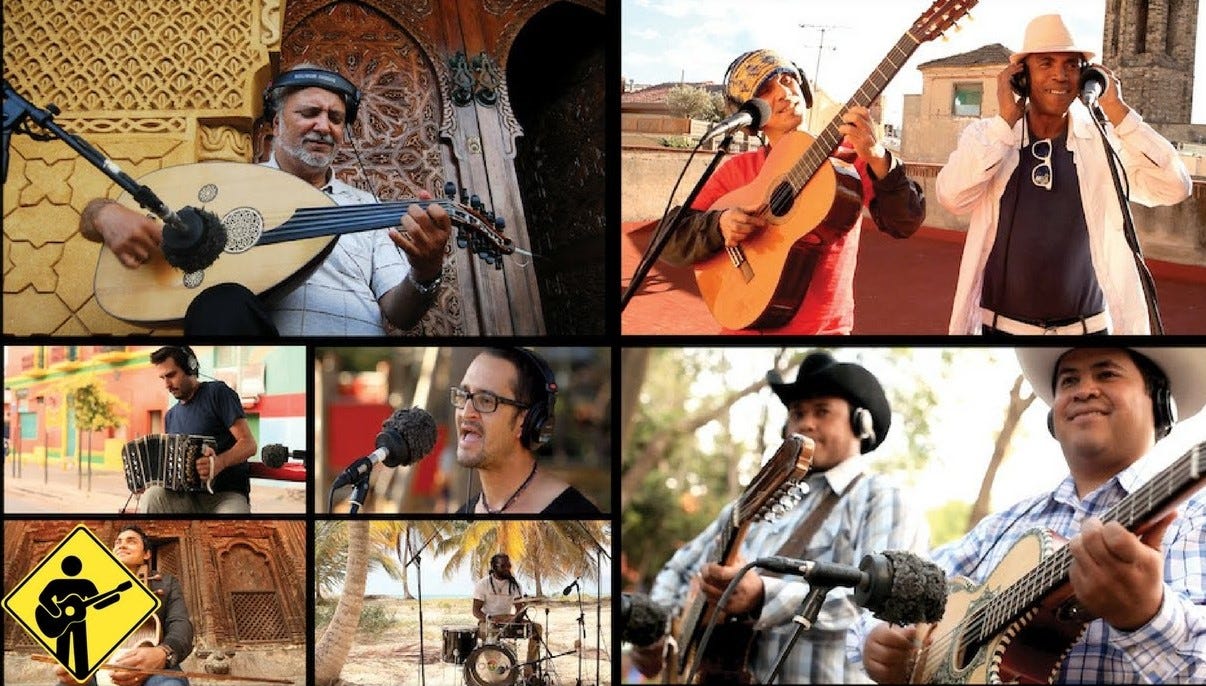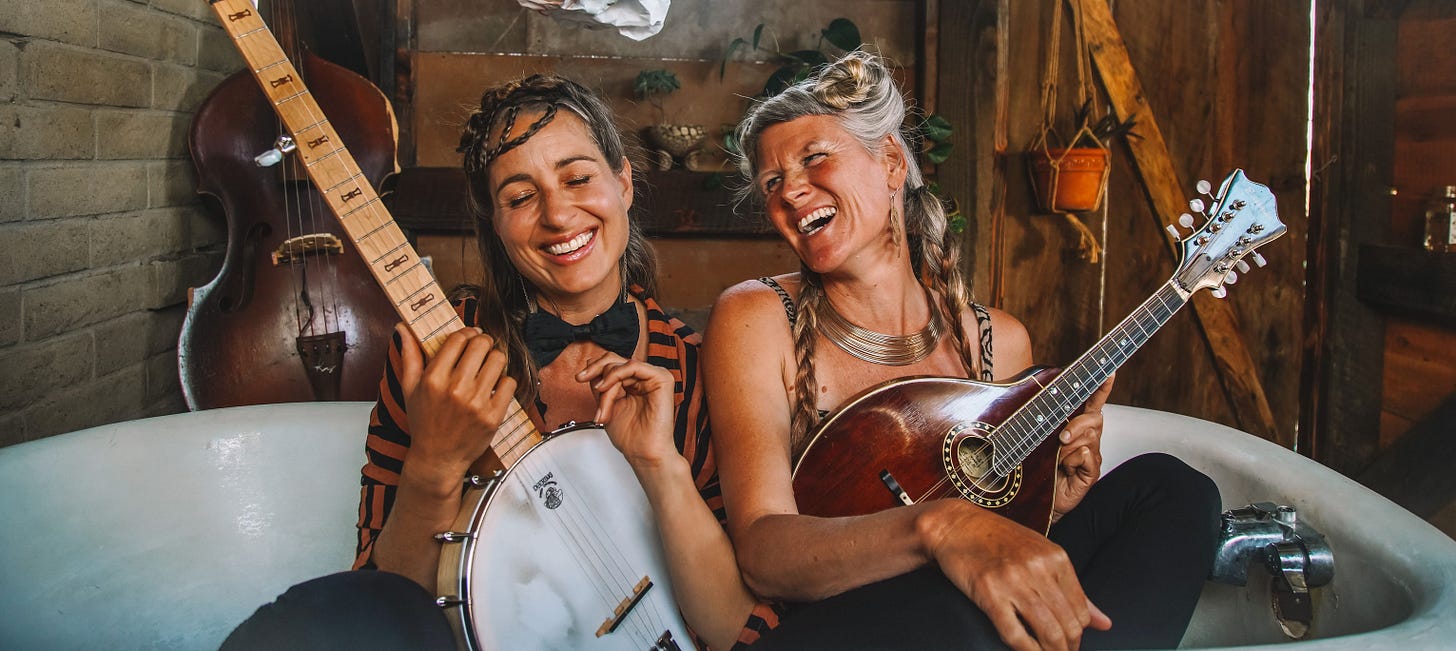
I don’t ordinarily do playlists. But the moment we’re living through is anything but ordinary.
It’s been a tumultuous few weeks. I’m relieved, of course (you may recall my last post not too charitably comparing President Biden to a worn-out boot). I think Harris will make a strong candidate. But election anxiety continues, layered over the sadness that has lingered since my father’s death. Most of the time I suppress those feelings. But sometimes in the evening I put on headphones, crank up the sound, and play a song or two that I know will not just release my emotions but amplify them. Somehow, it seems to help.
It’s an eclectic group of songs I turn to, most not new but in new arrangements. There are two pandemic-era virtual choirs – musicians in different locations who combine their tracks digitally into a single performance. There are also two “songs around the world” by Playing for Change, which films artists in far-flung countries collectively performing a well-loved song. New technology and the need to overcome barriers of covid and distance have led to new forms of musical collaboration.

Leonard Cohen’s “Hallelujah”
With its soaring melody and impenetrable lyrics, this is one of the most covered songs around. But this version stands out. The choir of Roedean School (SA), a multiracial girls’ school in Johannesburg, recorded the virtual performance in March 2020 after the pandemic forced their school to close. A lead singer, perhaps 16 years old, is backed by a chorus as the camera pans the buildings and grounds of the shuttered school. On piano is Roedean choirmaster Ralf Schmitt, who’s also the choirmaster of the renowned Ndlovu Youth Choir. The performance recalls the grief of early pandemic isolation as the school’s young people struggled to stay “together in spirit and song.” Watch and listen here.
A very different rendition of “Hallelujah” is by Choir! Choir! Choir!, a Toronto-based group known for drop-in singing events. In 2016 they invited 1,500 people to a decommissioned power plant in Toronto and taught them back-up parts to the Leonard Cohen classic. Canadian-American folk icon Rufus Wainwright joined on stage to sing the lead. Watch and listen here.

“Lift Every Voice and Sing”
African American history is American history, and in trying to understand that part of our nation’s past, I often find that music, images, and stories do more for me than history books. So it is with this rendition of the Black national anthem, written by James Weldon Johnson in 1900 and arranged here by award-winning composer Fred Onovwerosuoke. The virtual performance features Black professional musicians who are members of orchestras around the country or hold teaching positions. The music is set against a backdrop of historical and contemporary photos of Black freedom struggles. Watch and listen here.
Playing for Change
In Songs around the World, “musicians come together, transcending language and cultural boundaries, proving how we are all connected.” One of my favorites is Otis Redding’s “(Sittin’ on) The Dock of the Bay.” It’s performed here by musicians in Hawai’i, California, Spain, Jamaica, and Brazil, including the artist’s sons Dexter Redding and Otis Redding III. Watch and listen here (scroll up).
Manu Chao is a French-Spanish singer/songwriter whose songs often comment on immigration. “Clandestino,” he has said, is about “the border between Europe and those coming from poorer nations.” This version begins with an Oud master in Morocco and Roma musicians in Budapest and touches down in Cuba, India, Senegal, and half a dozen other countries. Watch and listen here (scroll up).
A recording that grabs me and doesn’t let go is the 1967 Bob Dylan classic “I Shall Be Released.” Filmed on a Barcelona street, it features powerhouse vocalist Clarence Bekker, a Dutch national born in Suriname, accompanied by Italian guitarist Roberto Luti. Watch and listen here (scroll up).
Girlyman
This playful, gender-bendy group produced six albums before disbanding in 2013. I love the three-part harmonies in “Easy Bake Ovens,” which conveys whimsical images of a 1970s suburban childhood (watch and listen here).
Mamuse
Drawing on folk and gospel traditions, Sarah Nutting and Karisha Longaker write songs and perform them a cappella or with acoustic instrumentation. “We Shall Be Known” reminds us to embrace life fully (watch and listen here):
We shall be known by the company we keep
By the ones who circle round to tend these fires
We shall be known by the ones who sow and reap
The seeds of change, alive from deep within the earthIt is time now, it is time now that we thrive
It is time we lead ourselves into the well
It is time now, and what a time to be alive
In this Great Turning we shall learn to lead in love
In this Great Turning we shall learn to lead in love
Similarly joyful are “Hallelujah” (not the Leonard Cohen song; listen here) and “Glorious” (listen here). When I need to work through sadness, I replay “On the 1” (listen here).
“Ashokan Farewell”
This ballad composed by folk musician Jay Ungar became the theme song for the 1990 PBS documentary “The Civil War.” Based on a Scottish lament, the song expresses “a sense of loss and longing,” according to Ungar. Sometimes those feelings just need to come out. Watch and listen here.
So that’s my playlist. I hope you find something here to like. And if you have your own favorites that help you through turbulent times, by all means share. Over the next few months, we’ll need all the help we can get.




Thanks so much! That really is a special play list
Thank you for these, Cathy. Music is without a doubt my go to stress reliever